英语语法课件
英语语法基础知识 ppt课件

Inflectional(‘s)
构词法
词(word) 句法功能
简单词(Simple ) 派生词(Derivative) 复合词 (Compound)
功能词(Function) 实义祠(Content)
分句类型(Types of clauses)
Independent (main; min S+V, complete) 独立分句 ( 主干, 主谓齐全,完整) I love linguistics. You believe me.
复合句:两个或两个以上的主谓结构,其中
一个(或多个)主谓结构充当句子的某一(些)成分,如: 主语、宾语、表语、定语、状语、同位语。 从属连词、连接代词、连接副词
This is an interesting book. This is the book which they talked about.
并列句Compound (2> independent clauses connected with co-ordinating conjunctions: 并列连词)
She read the book but she didn’t like it。
复合句Complex (a combination of dependent (subordinate) and independent clauses:从属连词、连接代词、连接副词)
并列句:两个或两个以上互相独立的主谓结
构、由并列连词连接。
Oliver came to the party, but Rose did not. Every room in the house has its own
function and it is difficult to imagine the life without one of them.
英语语法讲解课件-状语从句 ppt课件

ppt课件
11
状语从句分类
1. 2. 3. 4. 5. 6. 7. 8. 表示时间 表示地点 表示原因 表示结果 表示目的 表示条件 表示让步 表示比较
ppt课件 12
表示时间
一、时间状语从句 • When, as ,while, • before, after, • till, Until, • as soon as, • The moment, the minute, the first time…. (名词性短语)
ppt课件 21
E.G. 1. He was so angry that he left the room without a word. 他很生气,一句话不说就离开 了房间。 2. It is such a heavy box that nobody can move it. 3. The box is so heavy that nobody can move it. 4. The box is so heavy as nobody can move . 5. I didn’t go early, so that I didn’t get a seat.
ppt课件
30
表示比较
八、比较状语从句
主要由 • than, • as...as, • the more…the more • 这类从句常常有一些成分没有表示出来:
ppt课件 31
E.G.
• The more you eat, the fatter you are. • John is less clever than Tom. • He is not so/as clever as his brother.
ppt课件
高中英语语法 非谓语动词 动名词的用法课件(共58张PPT)

3) I shall never forget seeing the famous writer. 我__永__远___不__会__忘__记__见__到__过__那__位__著__名__ 作__家__。_
4) Don’t forget to write to your mother. 不__要__忘__了__给__你__母__亲__写__信__。_
E. go on doing 和 go on to do go on doing 继续做一直在做的事; go on to do 接着做另一件事。如:
1) 请接着做这同一个练习。
P__le_a_s_e_g_o__o_n_d_o_i_n_g_ the same exercise. 2) 请做另外一个练习。 P_l_e_a_s_e_g_o_o_n__t_o_d_o_ the other exercise.
一般式 完成式
主动形式 doing
having done
被动形式 being done having been done
一. 作主语 动名词作主语时,句子有三种形式:
①动名词直接置于句首主语的位置上。 1) 捉弄别人是我们万万不能干的.
_P_la_y_i_n_g_t_r_i_ck__s_o_n_o_t_h_e_r_s_ is something we should never do. 2) 学习新单词对我来说非常重要。
_it_i_s_p_l_e_a_sa_n__t _w_o_r___w_i_t_h_y_o_u_._____
③ 在there be结构中作主语,这种结 构的意思相当于“It is impossible to do… ” 如:
英语语法16种时态介绍ppt课件
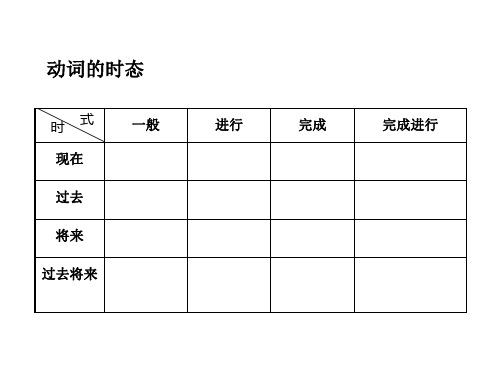
“意愿”,但不表示时态。
If you will accept my invitation and come to our party, my family will be pleased.如果你愿意接受并 参加我们的舞会,我的家人会非常高兴。
6)祈使句中 ( to give directions or instructions ) Go down the street, and then take the second turning on
the left.
知识扩展:一般现在时表将来
1)下列动词:come, go, arrive, leave, start, begin, return的一般 现在时表将来。这主要用来表示在时间上已确定或安排好的 事情 ( timetabled or fixed events )。 The train leaves at six tomorrow morning. When does the bus start? It starts in ten minutes.
You are always changing your mind. You are always doing well
He’s always asking the same question. 6. 状态动词的进行时后面接形容词brave; careful; stupid; clever; foolish; polite; kind; shy等时,为 主语所表现的非一般惯性特点或故意的行为。
6 )在the more…the more…句型中,从句也要用一 般现在时取代将来时。
初中英语零基础学语法--英语句子结构 课件(共43张PPT)

附属成分
基本成分的修饰语。可以是: • 定语:即用来修饰名词的单词、短语或从句 • 状语:即用来修饰名词或代词以外的词的单词、短语或从句。
定语
Poor John tottered toward a hospital nearby. She likes oranges imported from the USA.
省略成分
句中被省略的成分,虽然未说出来,却在句中表示 一定的意思:
(You) Come here. (I wish you)Good luck! Some gave him praises,but others(gave him)rotten eggs.
He runs as fast as, if ( he does ) not ( run ) faster, than you. ( I ) Hope you like it. John should clean the room today and Peter ( should clean it ) tomorrow.
主语、动词(不及物动词、及物动词、双宾动词、系动词、宾 补动词)、宾语及补语可以称为基本句子成分。完整的句子一 般至少包含2个基本成分,至多4个基本成分。
Vi(不及物动词)
主 语
谓 语
Vt(及物动词)
宾语 宾语(直) 宾语(间) 宾语 宾补
系动词
表语
be / feel / seem / look appear / stand / lie become /get / grow / turn go / come / remain/ keep taste / smell etc.
连接成分
连接成分实际上是一个连词,用来连接两个或几个平行的词、
初中英语语法课件ppt

过去将来时的使用:
一、过去将来时表示对于过去某一时间而言将要发生的动 作或存在的状态。 would或was /were going to + V
would可用于各种人称。
二、would +V还可表示过去的习惯动作,在这点上同used to同义。
When we were children, we would/used to go swimming every summer.
e) 用于条件从句“如果……想,设想”(接近if ……want to,或 if ……should) 例:Greater efforts to increase agricultural production must be made if food shortage ____________ avoided. A) is to be B) can be C) will be D) has been
一般现在时的动词形式: 动词原形 1.am;is ;are 2.have,has 3.第三人称单数形式-(e)s
肯定句:I watch television every day.
否定句:I don’t watch television every day.
疑问句:Do you watch television every day.
一般现在时的使用:
1.一般现在时表示总是、通常、习惯 性的动作或状态。
It snows in winter. I watch television every day.
2.用于对客观事实的普遍性的陈述。
Water consists of hydrogen and oxygen. Most animals kill only for food. The world is round.
英语语法基础知识PPT课件

数 人称 第一人称 第二人称
第三人称
单数
mine yours his hers its
复数
ours yours theirs
3)反身代词 表示反射(指一个动作回射到该动作执行者本身)或强 调(即用来加强名词或代词的语气)的代词叫做反身代 词。
数 人称 第一人称 第二人称
第三人称
单数
复数
3)反身代词 表示反射(指一个动作回射到该动作执行者本身)或强 调(即用来加强名词或代词的语气)的代词叫做反身代 词。
I saw many people walking along the lake.
The bridge built last year is now being repaired. 介词短语(prepositional phrase)如:
He came here by bus.
1.名词(noun)
the Great Wall Peiying Middle School
普通名词可进一步分为: 1)集体名词(collective noun): 集体名词是某一些人或物的总称。 例如:class team family army 2)物质名词(material noun) 物质名词表示物质或不具备确定形状和大小的个体的实物。 例如: water air hire steel grain 3)抽象名词(abstract noun) 抽象名词表示动作、状态、品质或其他抽象概念。 例如: happiness sadness work pleasure 名词又可分为可数名词(countable noun)和不可数名词 (uncountable noun): 可数名词: students computers tomatoes pianos 不可数名词: rain water pleasure advice 注意: glass glasses paper papers
小学英语语法全套PPTppt课件

如: I don't like bread. 当主语为第三人称单数,用doesn‘t构成否定句
如:He doesn't often play.
一般疑问句:Do( Does ) 主语 动词原形 其它。 如- Do you often play football? - Yes, I do. / No, I don't.
2.行为动词:主语 行为动词( 其它)。如: We study English.我们学习英语。 当主语为第三人称单数(he, she, it)时,
要在动词 后加“-s”或“-es” 如:Mary likes Chinese.玛丽喜欢汉语。
一般现在时的变化 1. be动词的变化。 否定句:主语 be not 其它。
Class One. 3. We _______(not watch) TV on
Monday.
4. Nick _______(not go) to the zoo on Sunday. 5. _____ they ______(like) the World Cup?
6. _______ your parents ______(read) news papers every day?
小学英语语法总复习
(三至六年级)
小学英语语法
❖ 一.名词复数规则 ❖ 二.一般现在时:一般现在时的构成和变化 ❖ 三.动词 s的变化规则 ❖ 四.现在进行时 ❖ 五.动词加ing的变化规则 ❖ 六.一般将来时 ❖ 七.一般过去时 ❖ 八.动词过去式变化规则 ❖ 九.形容词和副词的比较级 ❖ 十.形容词加er的规则 ❖ 十一.There be 句型与have, has的区别 ❖ 十二.人称代词和物主代词
高中英语语法大全PPT课件
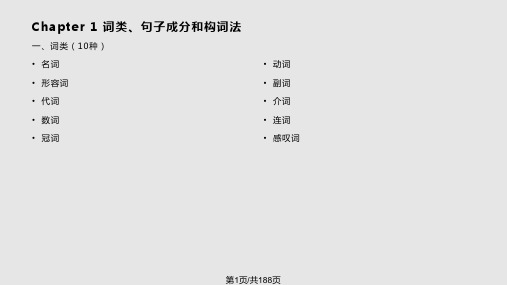
• 形容词→副词 early→early, fast→fast
• 副词→连词 when(什么时候)→(当……时候)
• 介词→副词 in(到……里)→(在里面;在家),on(在…上)→(进行,继续),
第6页/共188页
Chapter 2 名词
• 专有名词 Beijing, Tom, the People’s Republic of China • 普通名词
▲可数名词 ▲不可数名词
第7页/共188页
一、英语可数名词的单复数
• 规则变化 ①在单数名词词尾加s ②s,o,x ,sh,ch结尾的词加es ③以辅音字母加y结尾的名词,变y为i,再加es ④以f或fe结尾的名词,变f或fe为v,再加es。
第15页/共188页
主主格格 宾宾格格
第第一一人人 称称单单数数
第第二二人人 称称单单数数
第第三三人人称称单单数数
男男
女女
II
YYoouu hhee
sshhee
((我我))
((你你))
((他他))
((她她))
mmee
yyoouu
hhiimm
hheerr
((我我))
((你你))
((他他))
((她她))
语或者表语,后面千万不可以跟名词 eg. This is your cup,but where is mine?(这是你的杯子,可我的在哪儿?) • 双重所有格:“of + 名词性物主代词”
第18页/共188页
第一人 第二人 称单数 称单数
第三人称单数
男
女
中性
第一人 第二人 第三人 称复 称复数 称复数 数
大学英语语法ppt课件
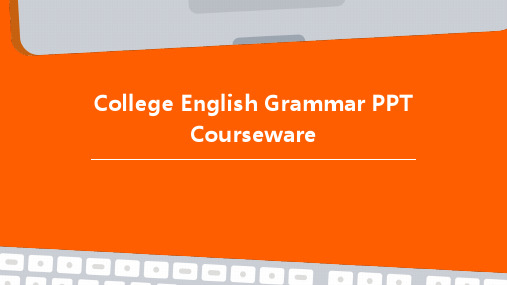
Conjunction
Conjunction refers to a word used to connect two or more sentences or components of a sentence.
Conjunctions are commonly used to connect two or more sentences or
Comparative and Superlative
Some advertisements have comparative and superlative forms that express degrees of comparison
Comparative and Superlative
Definition
College English Grammar PPT Courseware
目录
• Introduction • Noun • Verb • Subjects and advertisements • Positions and connections • Subordinate clause • Non fine verbs • Subjunctive mood
Common types of advertisements include banner, time, place, degree, and frequency advertisements
Placement
Advantageously come after the subject and before the verb in simple intentions
01
Introduction
Course Introduction
基本英语语法大全PPT课件PPT42页

“四大基本句型”
.
1第2页,共42页。
什么是四大基本句型
1 主动句型:主语+谓语(动词或 动词短语)
I study. We listen to the music. She takes care of her baby.
.
2第3页,共42页。
2 被动句型:主语+谓语( Be的过去分词)
I am thirsty.
My father is an engineer.
It will be cloudy tomorrow.
He has been in Beijing.
.
21第22页,共42页。
2变得:get, turn, grow, go, fall, become, come
He got angry. The leaves have turned red. The man has grown old. It never goes wrong. She soon fell asleep. My dream has come true.
一、时态的定义:时间+状态 二、时态的划分方法: 三、对四个时间段和四种状态的定义 时间分为:现在,过去,将来,过去将来。 状态分为:一般,进行,完成,完成进行。共 组合16种时态,其中8种是常用的。
.
23第24页,共42页。
感官联系动词:看起来, 听上去,闻 起来, 尝起来,摸起来,看来,显得 等等。
You look great.
His advice sounds reasonable.
The cheese smelled terrible.
The table feels smooth.
英语语法--助动词ppt课件
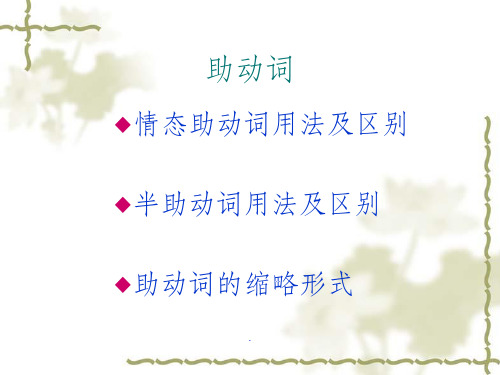
❖注意:
❖ (1)may/might比较
表推测时,might比may更不. 确定。 表允许时,might比may更有礼貌。
❖ (2)might may can could比较 a) may和can表可观可能和允许时意义相同,但是也
不能随意互换。表可观可能时 ,may仅用于肯定 句而can可用于各种句式。
.
❖ (3)表允许用于非正式场合。
Can在肯定疑问句中表要求在否定句中表禁止。
You can smoke in the entrance hall. Can you lend me 2yuan? Could 用于这个意义时只用于疑问句,语气更加委婉。
Could you please fetch us a few cups? ❖ (4)表感情色彩。表某种情绪。 What can satisfied her?(不满) What else can you say?(不耐烦) How can I do such a thing ?(难办)
他有时会很骄傲
.
2 may与might
(1)表示可以做或可能发生的事 He may come soon. You may order a taxi by telephone.
Might用于间接引语;也表客观未实现的动作 He said he might order a taxi by telephone. 他说他可以用电话定出租车。 He might have fallen ill if he hadn’t take the medicine. 他如果没服药可能就病倒了 (2)表允许,多用于肯定句和疑问句,正式场合 You may take the book home。 .你可以把这本书带回家。 May I borrow your bicycle? 我可以借你的自行车吗? Might 表允许时比may更有礼貌。 Might I have a little brandy? . 我可以喝一点白兰地吗?
小学英语语法汇总--ppt课件
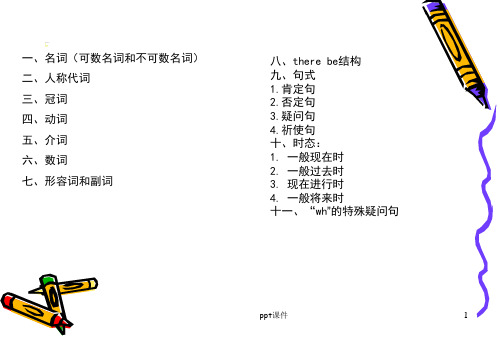
Were 3. ________ you on duty the day before yesterday?
was 4. Mr. King ________ in London two weeks ago. are 5. There ________ many kinds of animals in the zoo. was 6. What ________ the date yesterday? is 7. Look! A little girl ________ flying a kite.
3. It’s all right; it’s only _______m_e_(我).
4.
T_o_d_a_y________(我_w_们e__) (a我rwe们eg)oiwnegnitn i_n________________(_他o(u我们r 们的的). )
car; tomorrow theirs
ppt课件
13
零冠词的用法:
1. 泛指的抽象名词前。Life is very hard for some people. 2. 泛指的物质名词前。Water is very useful. 3. 泛指的复数名词前。Books are my best friends. 4. 泛指的“餐”名前。Come to have dinner/breakfast with me. 5. 大多数的专有名词前。He comes from France. 6. 语言的名词前。She can speak French. 7. 在季节和节日的名词前。Winter is the best time for skating. 8. 当名词前已有一些代词修饰时。My brother is a soldier. 9. 在体育项目的名词前。play basketball 10. 一些常用短语。 at home, go to school, at night
英语语法讲解句子结构PPT课件

Exercises 判断句型
1.Having finished his homework, the boy went on to help his mother.
(简单句划线部分在句中作状语,修饰 整个句子)
7. He was fond of drawing when
he was yet a chi复ld.合句
8. My brother and I go to school
at half past seven in the
morning at seven
ainndth简ceoem单vee句nbiancgk.
2. What he says doesn’t suit what he does.
(复合句包含两个名词性从句:What he says 是一个主语从句;what he does 是一 个宾语从句)
3. We often study Chinese
history on Friday aft简ern单oo句n.
句子
句子 句子 句子 成分 结构 种类
句子成分 主语:行为主体,句子描述的主体 谓语: 主语发出的动作 宾语: 动作的承受者
表语:表示主语“是什么”“怎么样” 状语:时间、地点、原因等 定语:用来修饰名词、代词
句子成分
主语:You beat him. 谓语: You beat him. 宾语: You beat him. 表语:He is bad./He is a boy. 状语:You beat him at home. 定语:You beat the bad boy.
英语语法5大最基本句型PPT课件

five basic sentence patterns • Summary and Review
contents
目录
• introduction • Overview of the Five Basic
Example sentence
"John gave a book to Mary."
Analysis
This pattern includes a subject (John), a predicate (gave), and an object (a book) that receives the action.
01 introduction
01 introduction
Purpose and background
Purpose
To provide a clear understanding of the 5 most basic sentence patterns in English grammar.
Good grammar is a prerequisite for strong writing skills. It lays the foundation for clear, coherent, and wellstructured writing.
Confidence
A good grasp of grammar gives one confidence in their writing and speaking abilities, allowing them to express themselves more freely and creatively.
英语语法名词单数变复数ppt课件

体的概念、状态、品质、感情或表示物质材料的东 西;它一般没有复数形式,只有单数形式,它的前 面不能用不定冠词a / an。抽象名词, 物质名词和专 有名词一般是不可数名词 如 water,milk
篮球比赛是根据运动队在规定的比赛 时间里 得分多 少来决 定胜负 的,因 此,篮 球比赛 的计时 计分系 统是一 种得分 类型的 系统
parents mothers fathers
sisters brothers sons daughters
cousins family families
child children man men
pencil cases
sheep sheep
篮球比赛是根据运动队在规定的比赛 时间里 得分多 少来决 定胜负 的,因 此,篮 球比赛 的计时 计分系 统是一 种得分 类型的 系统
pens
--What’re these ? --They’re … .
篮球比赛是根据运动队在规定的比赛 时间里 得分多 少来决 定胜负 的,因 此,篮 球比赛 的计时 计分系 统是一 种得分 类型的 系统
11..一般情况下,直接在词尾加-s 构成复数形式。
car cars
backpack backpacks
--What’s this? --It’s a pen.
--What are these?
--They are pens.
篮球比赛是根据运动队在规定的比赛 时间里 得分多 少来决 定胜负 的,因 此,篮 球比赛 的计时 计分系 统是一 种得分 类型的 系统
backpacks
oranges
watches
句子单数变复数
高中英语语法全套版ppt课件

The ______ of the building are covered with
lots of ______.
✓A.roofs; leaves
C.roof; leaf
B.rooves; leafs D.roofs; leafs
以 f 或 fe 结尾的名词变复数时: a. 加 s,如:serf --- serfs belief---beliefs roof---roofs chief --- chiefs safe---safes gulf---gulfs; b. 去 f, fe 加 ves,如:half---halves knife---knives leaf---leaves wolf---wolves wife---wives life---lives thief---thieves; c. 均可, 如:handkerchief --handkerchiefs / handkerchieves
以 s, sh, ch, x等结尾的名词变复数时加 –es;
但如果以 –ch 结尾的名词发音为 [k]时,只加 –s。
另外,以辅音字母 +y 结尾的名词变复数时,需将
y 变成 i,再加 -es;以元音字母 +y 结尾的则直接
加 -s。以辅音字母加 y 结尾的专有名词变复数时,
也直接加 -s。
问题2:
company is doing well. (03北京春季)(B)
✓ A.idea B.sense
C.thought D.Thinking
4. I keep medicines on the top shelf, out of the children’s
C. knowledge
B. knowledges D. the knowledge
《英语语法大全》PPT课件

(6)介词—副词 ,如:in(到……里)—(在里面;在家 ),on(在…上)—(进行 ,继续),等等
05
谢谢
2、派生法:
1)派生名词:
●动词 +er/or
●动词 +ing
●动词 +(t)ion
●形容词 +ness
●其他 ,如:inventor
learner swimming congratulation kindness
carelessness knowledge
2)派生形容词:
●Chinese; Japanese
07lish
●French
●German
●名词 +y
02
03
01
04
05
●名词 +ful
●dangerous
●动词 +ing/ed
●friendly
●国名 +(i)an 如:snowy sunny hopeful beautiful interesting following
daily(每日的 ) nervous delicious
7、宾语补足语 用来说明宾语怎么样或干什么 ,通常由形容词或动词充当。
如:They usually keep their classroom clean.
他们通常让教室保持清洁。
He often helps me do my lessons.
他常常帮我做功课。
The teacher wanted me to learn French all by myself.
如:He can spell the word.(他能拼这个词 )
有些及物动词带有两个宾语,一个指物 ,一个指人。指物的叫直接宾语,指人的叫间接宾语。间接宾语一般放在直接宾语的前面。 如:He wrote me a letter . (他给我写了一封信 )
大学英语语法课件ppt

It expresses the action or state that will happen in the future Example: "I will run"
The voice of verbs
Active Voice
It expresses the subject as performing the action Example: "I run"
04 Examples
"She runs quickly.", "He speaks soft.", "They will definitively win."
The comparative and superior forms of objections and advertisements
01
College English Grammar Courseware
contents
目录
• Noun • Article • Pronoun • Verb • Subjects and advertisements • Preparation • Subordinate clause
01
Noun
02
Indefinite articles are used with nouns that are not specific or known
03
Indefinite articles are used with nouns that are the first of their kind
The define article
03
"He is the smartest student in the class." or "She sings the most beautiful."
- 1、下载文档前请自行甄别文档内容的完整性,平台不提供额外的编辑、内容补充、找答案等附加服务。
- 2、"仅部分预览"的文档,不可在线预览部分如存在完整性等问题,可反馈申请退款(可完整预览的文档不适用该条件!)。
- 3、如文档侵犯您的权益,请联系客服反馈,我们会尽快为您处理(人工客服工作时间:9:00-18:30)。
Absolute Construction独立主格结构实质上就是带有自己主语的非限定分句或无动词分句。
它的逻辑主语与句子的主语不同,在结构上游离于主句之外。
独立主格结构本身不是句子,在句子中作状语,表示时间、原因、条件、伴随等。
* Weather permitting, I will start tomorrow.*His homework done,Jim decided to go to see the play. =After his homework was done, Jim…* The meal over,we began to work again.=When the meal was over, we began to work again.独立主格结构按其结构形式可分为:现在分词独立结构、过去分词独立结构、无动词独立结构(名词、形容词、副词、介词短语等)和不定式独立结构.特别注意:独立主格结构使用介词的问题肯定意义的独立主格结构一般均可转变为用 with引导的独立结构,而表示否定意义的独立主格结构可转变为由without引导的独立结构。
He put on his socks,wrong side out. =He put on his socks with the wrong side out.独立主格结构位置很灵活,可位于句首、句中或句尾,放在句尾时,通常用逗号将其与主句隔开常见的独立主格结构有如下几种:1. 名词/主格代词+现在分词。
(主谓关系) 如:The girl staring at him (= As the girl stared at him), he didn‟t know what to say. 姑娘两眼望着他,他不知道说什么好。
Time permitting , we will go for an outing tomorrow.2. 名词/主格代词+过去分词。
名词/主格代词与过去分词之间的动宾关系。
如:*The problems solved (= As the problems were solved), the quality has been improved.随着问题的解决,质量已经提高了。
* Her glasses broken (= Because her glasses were broken), she couldn‟t see the words on the blackboard. 由于眼镜摔坏了,她看不见黑板上的字。
*The test finished, we began our holiday.3. 名词/主格代词+不定式。
名词/主格代词与不定式之间是主谓关系,且强调的是一次具体性的动作。
如:He is going to make a model plane, some old parts to help. 借助于一些旧零件,他要做一个飞机模型。
They said good-bye to each other, one to go home, the other to go to the bookstore. 他们道别后,一个回了家,一个去了书店。
4. 名词/主格代词+形容词。
如:So many people absent, the meeting had to be called off. 这么多人缺席,会议不得不取消。
5. 名词/主格代词+副词。
如:The meeting over, they all went home. 会议一结束,他们就都回家了。
6. 名词/主格代词+介词短语。
如:The boy goes to the classroom, book in hand.那男孩手里拿着书去教室。
Mary was sitting near the fire, her back towards the door. 玛丽靠近火炉坐着,背对着门。
注: 对于独立主格结构,首先应明白它不是一个完整的句子,是由逻辑主语,再加非谓语或名词、形容词、副词构成的一个句子成分,一般做状语.Adverbial clauseAn adverbial clause is a clause that functions as an adverb.As we know, an adverb may be a single word such as quickly, here or yesterday, or a phrase such as the day before yesterday or to see my mother. However, adverbs can also be clauses, containing a subject and a verb. Today, we‘ll discuss the basic types of Adverbial clauses and how to use them.There are many types of Adverbial clause. Here are some examples of the most common types:Adverbial clause of time/ place/ cause / purpose;.She took a computer course so that she could get a better job.Concession Why is this unexpected?Although Jay has a Master's degree, he works as a store clerk.Though he is poor, he's happy. 虽然穷,但他很快乐。
Condition Under what conditions?If you save your money, you will be able to go to college.manner as You should do as I tell you. 你必须按我告诉你的去做。
result that, so…thatHe was so angry that he couldn't speak. 他气得话都说不出来。
Usual conjunction:after, as, before, once, since, till, until, when, whenever, while,now (that), as soon as, as long as, no sooner…than等。
有些名词短语也可以引导状语从句,如the moment, the instant例如:Her father died when she was young.As the sun rose, the fog dispersed.The instant he received the letter, he started off at once.Every time he went to Beijing, he used to visit the Great Wall.注1:till和until在主句谓语为持续性动词的肯定式时,作―直到……为止‖解,在主句谓语为瞬间动词的否定式时作―直到……才‖解,如:Let‘s wait till / until the rain stops.I did not begin work till / until he had gone.注2:once, the moment, the instant和as soon as都作―一…就‖解,通常可互换,如:Once you understand this, you will surely make rapid progress in your study.注3:由副词加从属连词no sooner than, hardly / barely / scarcely…when等引导的时间状语从句,如hardly, barely, scarcely前置句首,主谓须用倒装结构。
如: Hardly had the film started when they came. No sooner had we reached the top of the hill than we all sat down to rest.usual conjunction:where, wherever , everywhere, anywhere例如:You may stay where you like./ He is welcome wherever he goes.Wherever I am I will be thinking of you. 不管我在哪里我都会想到你。
Put the medicine where children can‘t reach it. 把药放在孩子们拿不到的地方You can‘t camp where /wherever/ anywhere you like these days. 如今你可不能随便在哪儿宿营。
Where there is a will, there is a way.Everywhere Jenny goes she‘s mistaken for her sister. 无论走到哪里,詹妮都被误认为是她妹。
) 比较because, since, as和for:1)because语势最强,用来说明人所不知的原因,回答why提出的问题。
I didn't go because I was afraid. 我不去是因为我怕。
Since /As the weather is so bad, we have to delay our journey. 天气那么糟,旅行推迟了。
2)由because引导的从句如果放在句末,且前面有逗号,则可以用for来代替。
但如果不是说明直接原因,而是多种情况加以推断,就只能用for。
例如:He is absent today, because / for he is ill. 他今天缺席,因为他病了。
He must be ill, for he is absent today. 他一定病了,所以今天缺席。
3) as 是从属连词,说明一般的因果关系,语气比because弱,说明比较明显的原因,它引导的从句通常放在句首,有时也可放在句末。
例:As it is raining, you\'d better take a taxi. 天下雨了,你最好乘出租车。
